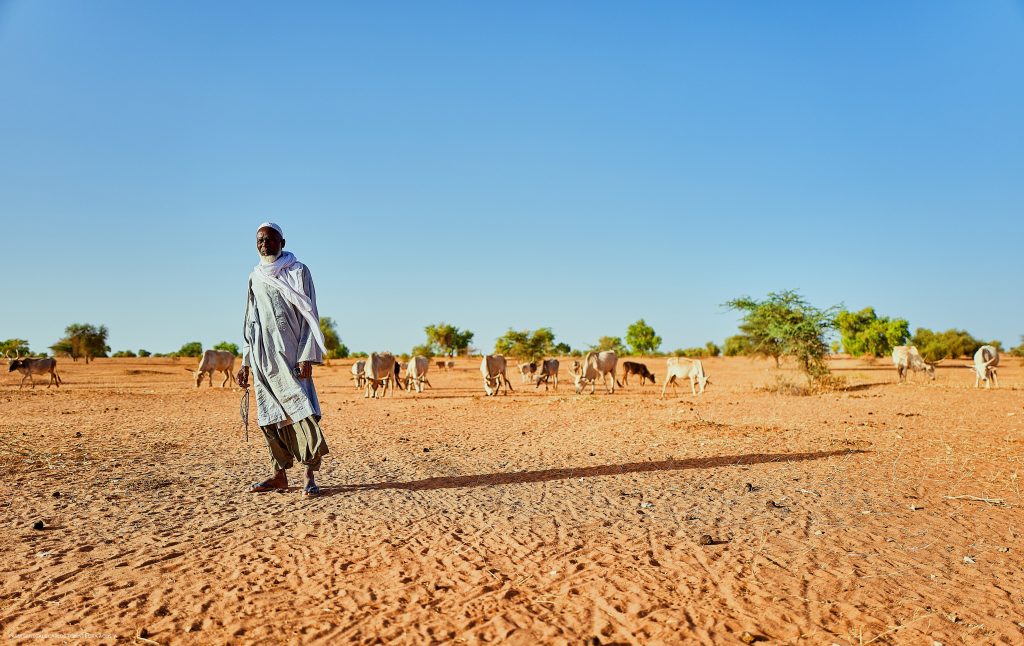Climate Security in the Sahel

The Sahel is a particular case where the interaction between climate-conflict can be strongly observed. With a high-dependence on rain-fed agriculture and livestock, climate variability, especially droughts, leave pastoralists and smallholders in this region particularly vulnerable. Moreover, the region remains fragile, embodied by factors such as weak capacity of the state, inter-group inequality and a history of violent conflict.
In this Webinar, guest speakers will discuss the drivers of conflict in the Sahel, and how climate-smart interventions can help to alleviate these tensions.
COVER PHOTO CREDIT:
©PARM/Carlos Acosta
Bruno Charbonneau
Director, Centre FrancoPaix in Conflict Resolution and Peace Mission
Bruno Charbonneau (PhD Queen’s University) is Associate Professor of International Studies at the Royal Military College Saint-Jean, Canada. He is cofounder and Director of the Centre FrancoPaix in Conflict Resolution and Peace Missions of the Raoul-Dandurand Chair at the Université du Québec à Montréal. He specializes in the international politics of armed conflict management, with a particular expertise in the Francophone West African Sahel. He is currently working on the consequences of counterinsurgency practices in the Sahel and how international intervention policy is transformed by and through an increasing emphasis on the Sahel as a space for climate intervention and experimentation. His research has been funded by, among others, the Social Sciences and Humanities Research Council of Canada, the Organisation internationale de la Francophonie, Global Affairs Canada, and the Canadian Ministry of National Defence. He is the author of France and the New Imperialism: Security Policy in sub-Saharan Africa (2008), and coeditor of Peace Operations in the Francophone World: Global Governance Meets Post-Colonialism (2014), Peacebuilding, Memory and Reconciliation: Bridging Top -down and Bottom-up Approaches (2012) and Locating Global Order: American Power and Canadian Security After 9/11 (2010). His research has been published in several world-renowned academic journals: Review of International Studies, International Political Sociology, International Peacekeeping, Les Temps modernes, Afrique contemporaine, Journal of Contemporary African Studies, Journal of Intervention and Statebuilding, Conflict, Security & Development, Civil Wars, Canadian Journal of Political Science, and more. Current publication projects include a book manuscript on Mali (with Adam Sandor and Jonathan Sears) under contract with Zed Books, and the edited Routledge Handbook of African Peacebuilding, under contract with Routledge
Robert Zougmoré
Africa Program Leader, CGIAR Research Program on Climate Change, Agriculture and Food Security
Robert B. Zougmoré is the Africa Program Leader of the CGIAR Research Program on Climate Change, Agriculture and Food Security (CCAFS), based at ICRISAT, Bamako, Mali. He is an agronomist and soil scientist with a PhD in Production Ecology & Resources Conservation from the University of Wageningen, The Netherlands. Dr. Zougmoré is defining and overseeing strategic directions for CCAFS research in the West and Central Africa (WCA) region. This involves coordinating actions that lead to coherent implementation of regional activities from participating Centres and other regional and national partners. One of his major tasks is to communicate regional research outputs and strategy through innovative means in order to project a highly professional image for CCAFS and the CGIAR. He also contributes to the themes of Systems Analysis, and Policy and Impact within the ICRISAT regional research program in WCA.
Before joining ICRISAT, he was a senior staff with the Sahara & Sahel Observatory (Tunisia) where he contributed to the implementation of initiatives pertaining to desertification, land degradation and drought; and to climate change adaptation in Africa. Prior to that, he spent a year in Japan as a Postdoc at JIRCAS, working on the benefit of conservation agriculture for soil and water conservation.
From 1990 to 2007, he was senior researcher and head of the Natural Resources Management and farming systems at the Institute for Environment and Agricultural Research in Burkina Faso. He has developed adaptation options and strategies on climate variability and land degradation in the vulnerable arid and semi-arid ecosystems. He has also been a part-time lecturer at Cape Coast, Niamey and Bobo-Dioulasso Universities, Aghrymet, and the Katibougou Polytechnic Institute in Mali. He has also been the Secretary General of the Africa Soil Science Society.
Dr. Zougmoré has published over 50 papers and book chapters on soil erosion, integrated soil, water and nutrient management options and their economic benefits, and climate-smart agriculture.
Cedric H. de Coning
Senior Research Fellow in the Research Group on Peace, Conflict and Development at the Norwegian Institute of International Affairs (NUPI)
He has 30 years of experience in research, policy advise, training and education in the areas of conflict resolution, peacekeeping, peacebuilding and peace and conflict studies. Cedric has a Ph.D. in Applied Ethics from the Department of Philosophy of the University of Stellenbosch, and a M.A. (cum laude) in Conflict Management and Peace Studies from the University of KwaZulu-Natal.